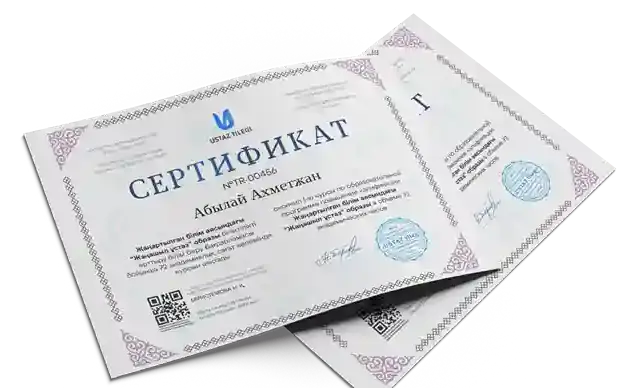|
Unit of a long term
plan: Unit 5 Lesson plan
54
|
School:
|
|
Date:
|
Teacher’s
name:
|
|
Class: 9
|
Number
present:
|
Number
absent:
|
|
Lesson title
|
Planning a
project.
Talking about how to plan an event.p.
62
A book blurb.
p.63
|
|
Learning objectives(s) that
this lesson is contributing to
|
9.S1 provide basic information
about themselves and others at sentence level on an increasing
range of general topics
9.C6 organise and present
information clearly to others
9.R5 deduce meaning from context in
extended texts on a wide range of familiar general and curricular
topics, and some unfamiliar topics
9.W1 plan, write, edit and
proofread work at text level with support on a limited range of
general and curricular topics
9.W5 link without support
sentences using basic coordinating
connectors
|
|
Lesson objectives
|
All learners will be able
to:
|
-
Understand the main ideas of
the dialogue in which people plan a book club and describe a
book.
-
Recognize key phrases and
Future Continuous to talk about future
activities.
-
Act situations
making, accepting a future plan.
Most learners will be able
to:
-
Understand details in
listening extracts.
-
Use topic related vocabulary
in their dialogues.
-
Create their own dialogues
based on the given situations and act.
Some learners will be able
to:
-
Understand detailed
information from the dialogues while
listening.
-
Apply topic related vocabulary
in speech fluently.
-
Create their own dialogues on
the topic without support and act.
|
|
Value
links
|
Cooperation, respect each
other's opinion, functional literacy.
|
|
Crosscurricular links
|
Literature, Social Science,
Psychology, Information Technology.
|
|
Previous
learning
|
Talking about future
events.
|
|
Useof ICT
|
Smart board for showing a
presentation, getting additional information,playing the audio
files.
|
|
Intercultural
awareness
|
Students will be able to
understand that people should attend a book club and be able to
describe a book they have read.
|
|
Health and
Safety
|
Breaks and physical activities
used.
|
|
Plan
|
|
Planned
timings
|
Planned
activities
|
Resources
|
|
Beginning the lesson
6
min.
|
The lesson
greeting.

The teacher sets the lesson
objectives, letting students know what to anticipate from the
lesson.
Warm
up. Free
talk.
-
What do you usually
do after school? When and where do you meet your friends? Ex.1
p.62
-
Look at the photo on
p. 62 and guess the topic of their conversation? Write the theme on
lists of paper.
-
Do you know the
meaning of a word a “book blurb”

|
Slide (useful
phrases)
Pictures
PPT
Student Book
p.62
Writing
Worksheet
A
picture
|
|
Main
Activities
15
min.
13
min
|
LISTENING
TASK:
Listen to the dialogue and
answer the question: How will book club members decide which books
to read?
In groups of 3, write the work
of a book club and choose the first book to read and discuss
together.
Look at the key phrases.
Invitations. Ex.3 p.62. Sentence
completion task. Role-play.
The teacher offers the
groups 5
books and asks them to read the book
blurbs and speak about the books.
Ex.1 p.63 Work with the blurb
of “The Lost World”. Find compound adjectives and quantities in the
text.
|
Compound
adjectives
|
Quantities
|
|
|
|
|
|
|
|
|
|
|
|
|
Ex. 2 – 3 p.63 (a pair –
work).
Writing
Guide:
A Blurb in English for any
book.
|
Student Book
p.62
CD2.16
CD2.07.
Pair work.
Teacher's
Photocopiable Resources
p.203
Student Book
p.63
A
Table
Student Book
p.63
Writing
Worksheet
|
|
Ending the lesson
6
min.
|
Giving the home
task.
Ex.4 p.63 (project), W.B. p.43 Ex. 1
-2
Students express their
attitude to the lesson and give self-assessment using
the method:
“Six thinking
hats”:
-
Green: How can you use today's
learning in different subjects?
-
Red: How do you feel about
your work today?
-
White: What have you leant
today?
-
Black: What were the
weaknesses of your work?
-
Blue: How much progress have
you made in this lesson? (Now I can, I still need to work on, I've
improved in, Today I learnt... )
Yellow: What did you like
about today's lesson?
Slide
(Homework)
Slide "Six thinking
hats"

|
|
Differentiation
–
how do you plan to give
more support? How do you plan to challenge the
more
able
learners?
|
Assessment
–
how are you planning to
check learners’learning?
|
Critical
thinking
|
|
Differentiation can be
achieved through the selection of activities, identification of
learning outcomes for a certain student, provision of individual
support to learners, selection of learning materials and resources
based on the individual abilities of
learners.
|
Assessment
criteria:
-
Identify the main idea in
extended talks with little support.
-
Apply topic related vocabulary
in speech appropriately arranging words and phrases into
well-formed sentences.
-
Demonstrate the ability to
participate in a conversation.
Descriptor:
A
learner:
-
selects an appropriate
answer.
-
completes the
task.
-
uses appropriate
subject-specific vocabulary while
speaking.
-
discusses questions and
answers the questions within the
group.
-
Observation
-
Feedback on the work
-
Peer-assessment
|
Students think critically,
exploring, developing, evaluating and making choices about their
own and others’ ideas
|














